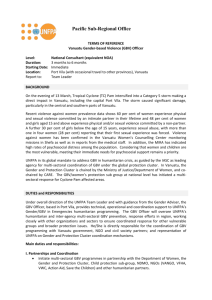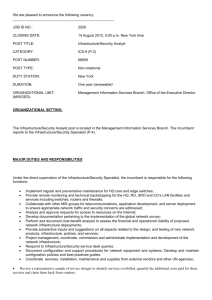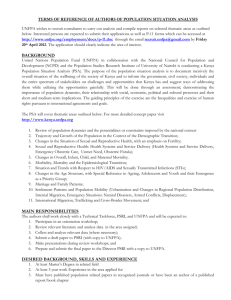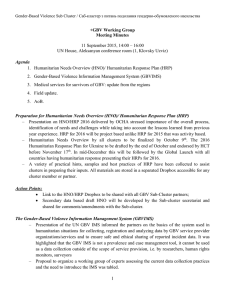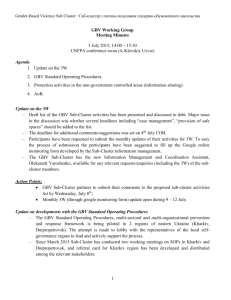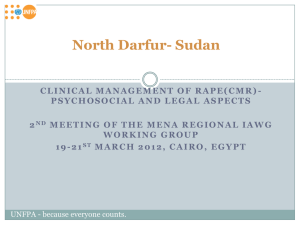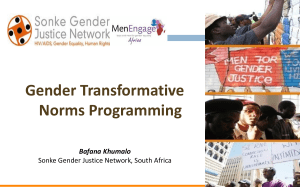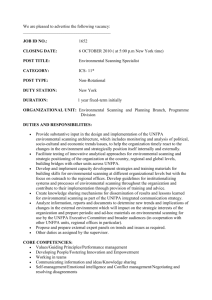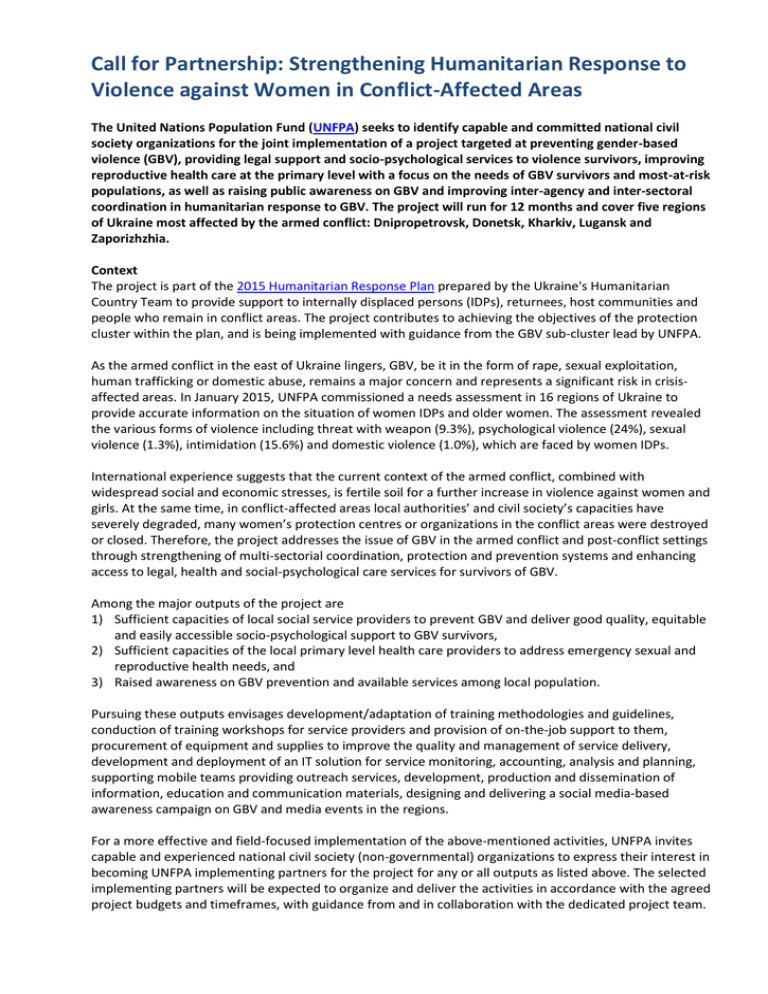
Call for Partnership: Strengthening Humanitarian Response to
Violence against Women in Conflict-Affected Areas
The United Nations Population Fund (UNFPA) seeks to identify capable and committed national civil
society organizations for the joint implementation of a project targeted at preventing gender-based
violence (GBV), providing legal support and socio-psychological services to violence survivors, improving
reproductive health care at the primary level with a focus on the needs of GBV survivors and most-at-risk
populations, as well as raising public awareness on GBV and improving inter-agency and inter-sectoral
coordination in humanitarian response to GBV. The project will run for 12 months and cover five regions
of Ukraine most affected by the armed conflict: Dnipropetrovsk, Donetsk, Kharkiv, Lugansk and
Zaporizhzhia.
Context
The project is part of the 2015 Humanitarian Response Plan prepared by the Ukraine's Humanitarian
Country Team to provide support to internally displaced persons (IDPs), returnees, host communities and
people who remain in conflict areas. The project contributes to achieving the objectives of the protection
cluster within the plan, and is being implemented with guidance from the GBV sub-cluster lead by UNFPA.
As the armed conflict in the east of Ukraine lingers, GBV, be it in the form of rape, sexual exploitation,
human trafficking or domestic abuse, remains a major concern and represents a significant risk in crisisaffected areas. In January 2015, UNFPA commissioned a needs assessment in 16 regions of Ukraine to
provide accurate information on the situation of women IDPs and older women. The assessment revealed
the various forms of violence including threat with weapon (9.3%), psychological violence (24%), sexual
violence (1.3%), intimidation (15.6%) and domestic violence (1.0%), which are faced by women IDPs.
International experience suggests that the current context of the armed conflict, combined with
widespread social and economic stresses, is fertile soil for a further increase in violence against women and
girls. At the same time, in conflict-affected areas local authorities’ and civil society’s capacities have
severely degraded, many women’s protection centres or organizations in the conflict areas were destroyed
or closed. Therefore, the project addresses the issue of GBV in the armed conflict and post-conflict settings
through strengthening of multi-sectorial coordination, protection and prevention systems and enhancing
access to legal, health and social-psychological care services for survivors of GBV.
Among the major outputs of the project are
1) Sufficient capacities of local social service providers to prevent GBV and deliver good quality, equitable
and easily accessible socio-psychological support to GBV survivors,
2) Sufficient capacities of the local primary level health care providers to address emergency sexual and
reproductive health needs, and
3) Raised awareness on GBV prevention and available services among local population.
Pursuing these outputs envisages development/adaptation of training methodologies and guidelines,
conduction of training workshops for service providers and provision of on-the-job support to them,
procurement of equipment and supplies to improve the quality and management of service delivery,
development and deployment of an IT solution for service monitoring, accounting, analysis and planning,
supporting mobile teams providing outreach services, development, production and dissemination of
information, education and communication materials, designing and delivering a social media-based
awareness campaign on GBV and media events in the regions.
For a more effective and field-focused implementation of the above-mentioned activities, UNFPA invites
capable and experienced national civil society (non-governmental) organizations to express their interest in
becoming UNFPA implementing partners for the project for any or all outputs as listed above. The selected
implementing partners will be expected to organize and deliver the activities in accordance with the agreed
project budgets and timeframes, with guidance from and in collaboration with the dedicated project team.
Requirements
Official registration as a non-profit legal entity in Ukraine
Specialization in GBV services (for organizations applying for output 1) AND/OR sexual and reproductive
health services (for organizations applying for output 2) AND/OR public information, awareness raising
and mass communications (for organizations applying for output 3)
Sufficient technical and human resources capacity for professional training in social services, GBV
issues, sexual and reproductive health (for organizations applying for outputs 1 and 2)
Sufficient management capacity to deliver complex multi-stakeholder projects
Field presence (through own branches or networking) in all five regions covered by the project:
Dnipropetrovsk, Donetsk (government and non-government controlled territories), Kharkiv, Lugansk
(government and non-government controlled territories), and Zaporizhzhia
Experience of implementing international projects is desirable
Knowledge of the UN operational policies and procedures is an advantage
Process
Interested organizations should submit their expressions of interest to UNFPA at ukr@unfpa.org by COB 19
June 2015 enclosing the information listed below (please attach documents signed by the Chief Executive
Officer as scanned copies in pdf format):
Expression of interest letter explaining how the organization meets all the requirements and its
comparative advantages
Full legal name, address and contact information of applying organization
Copy of valid legal registration in the country
Documented fulfilment of tax obligations and tax registration/EDRPOU number
Copy of audited financial statements for the past three years
Organizational structure chart (organigramme) and description of field presence in the project regions
Short description of previous and existing activities in the subject matter area(s) and how long the
activities have been carried out in each of the areas
Within one week upon receipt of the above information from prospective implementing partners, UNFPA
will screen and pre-select applicants for a short list. A more detailed description of the scope of work will
be provided individually to those candidates that have been pre-selected by UNFPA.
Following a screening process of expressions of interest, UNFPA will directly contact the shortlisted
organizations to conduct a formal capacity assessment of the organization. The capacity assessment may
include governance and leadership, administrative systems, human resources, technical capacity and
knowledge management, financial management, internal controls, procurement system, activity tracking
and reporting, monitoring and evaluation, geographic coverage, partnerships and networking, past
experience and reference checks. Successful candidates will be offered to enter into a standard
Implementing Partner Agreement with UNFPA.
Notes
Due to the high volume of communications, UNFPA is not in a position to confirm receipt of expressions
of interest
The scope of work described in this Call for Partnership could be subject to change
UNFPA will be able to only contact shortlisted organizations
For clarifications regarding this Call for Partnership please contact Ms. Olga Osaulenko
(osaulenko@unfpa.org)

